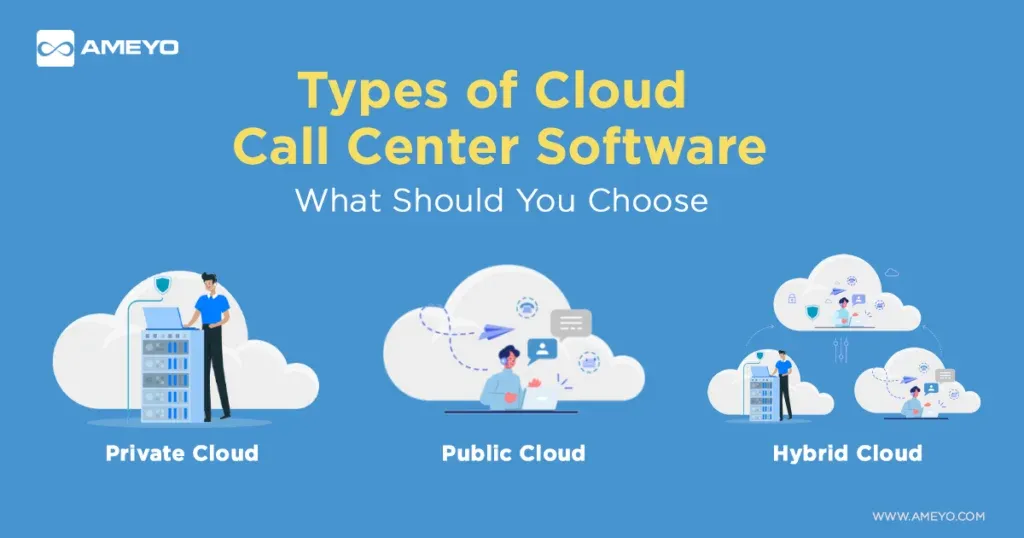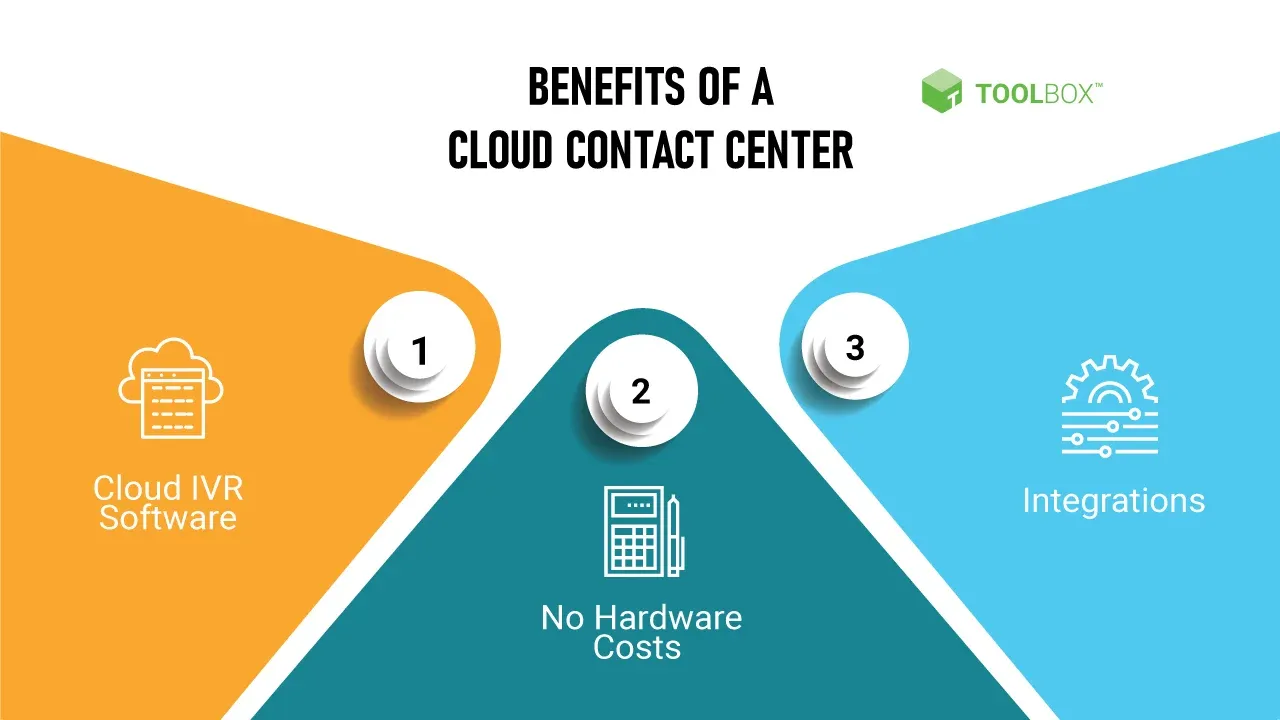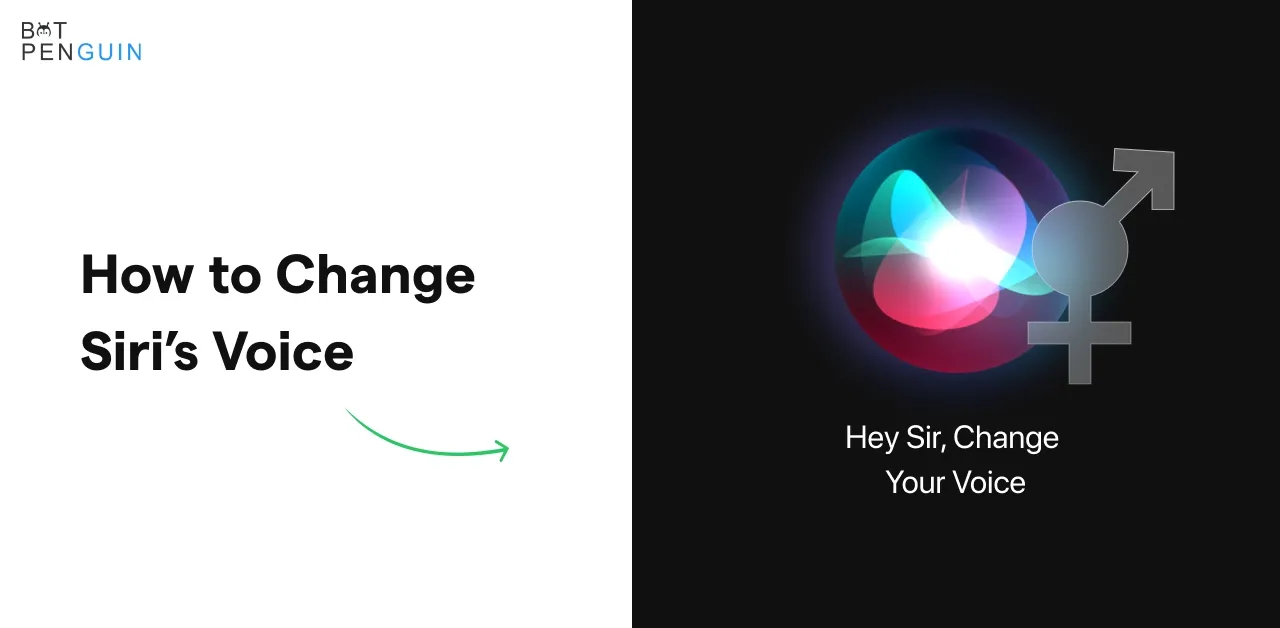Ever found yourself stressing over customer service, struggling with outdated technology, and dealing with high costs?
If you've been there, you're in the right place. The good news is that the solution might be simpler than you think.
Say hello to the cloud contact center – a game changer for your business.
Switching from old-fashioned call centers to this modern approach can boost efficiency, lower costs, and make customers happy.
But you might ask, what is a cloud contact center, and why does your business need it?
In this blog post, we're going to break it all down and show you the amazing benefits of cloud technology for customer service. Let's dive right in!
What is a Cloud Contact Center?
A cloud contact center, a virtual or hosted contact center, is a customer service solution that operates entirely in the cloud.
Unlike traditional call centers that rely on on-premises hardware and software, cloud contact center solutions leverage cloud-based technology to handle customer interactions through various communication channels.

Why do you need Cloud Contact Center?
Now that we have a good grasp of the basics let's explore the advantages cloud contact centers bring. These advantages explain why businesses of all sizes are switching and reaping the benefits.
Cloud contact center solutions help in Flexibility and Scalability
One of the standout advantages of cloud contact centers is their flexibility and scalability. With cloud-based solutions, businesses can quickly scale up or down their customer service operations based on demand.
Whether you need to handle seasonal peaks or accommodate business growth, cloud contact centers provide the agility to adapt to changing requirements.
Cloud contact center solutions are cost effective
Traditional on-premises contact centers often involve significant upfront investments in infrastructure, hardware, software licenses, and maintenance.
In contrast, cloud contact centers operate on a subscription-based model, eliminating the need for hefty upfront costs.
This cost structure allows businesses to pay for what they use, reducing the financial burden and providing cost predictability.
Cloud contact center solutions enhances customer experience
In today's competitive business landscape, providing exceptional customer experiences is paramount. Cloud contact centers enable businesses to deliver personalized and efficient support across various channels.
Features like intelligent call routing, self-service options, and integration with customer relationship management (CRM) systems help businesses deliver a seamless and tailored customer experience, resulting in higher satisfaction and loyalty.
Cloud contact center solutions have global accessibility and remote workforce
Cloud contact center solutions offer global accessibility, allowing businesses to reach customers across different locations. Additionally, they empower organizations to build a remote workforce by enabling agents to work from anywhere with an internet connection.
This flexibility in agent location ensures round-the-clock customer support and opens up opportunities for hiring talented agents from diverse backgrounds.
Suggested Reading-
10 Reasons to Switch to a Cloud Contact Center
The Key Components of a Cloud Contact Center
In this section, we'll explore the essential components of a cloud contact center. These components work together harmoniously to deliver efficient customer service.
Automatic Call Distribution (ACD) System: Routing Calls with Precision
The Automatic Call Distribution (ACD) system is the backbone of a cloud contact center. It intelligently routes incoming customer calls to the most suitable agent based on predefined criteria.
Whether skill-based routing, priority-based routing, or even routing based on customer preferences, the ACD system ensures that customers are swiftly connected to the right person who can address their needs effectively.
Interactive Voice Response (IVR): Your Virtual Receptionist
Imagine a virtual receptionist greeting your customers when they call and providing them with self-service options. That's the power of Interactive Voice Response (IVR) in a cloud contact center.
The IVR system uses voice prompts and menu options to guide callers, allowing them to access information, make selections, or even resolve simple issues without speaking with a live agent.
It enhances efficiency and frees up agents to focus on more complex inquiries.
Call Routing and Queuing: Smoothing the Customer Journey
Nobody likes waiting on hold. That's where call routing and queuing mechanisms come into play.
These components ensure incoming calls are distributed efficiently among available agents, minimizing wait times and creating a seamless customer experience.
By managing call volumes effectively, cloud contact centers can reduce customer frustration and improve overall satisfaction.
Real-time Analytics and Reporting: Insights for Continuous Improvement
Data is power, and cloud contact centers provide businesses valuable real-time analytics and reporting features. These tools offer insights into agent performance, call metrics, customer satisfaction levels, and more.
Businesses may make wise judgments, spot opportunities for development, and streamline customer service operations with access to this data.
You are guided toward improved performance and customer satisfaction like you had a crystal ball.
Multi-channel Communication: Meeting Customers Where They Are
Cloud contact centers facilitate seamless multi-channel communication, enabling businesses to provide consistent support across different platforms.
Agents can effortlessly switch between channels, ensuring that customers receive the assistance they need, regardless of their preferred mode of communication.
Choosing the Right Cloud Contact Center Solutions
Now that we understand the key components of a cloud contact center, it's essential to choose the right solution that aligns with your business needs. Here are some factors to consider when selecting a cloud contact center solution.
In this section, we'll cover the crucial aspects to consider when choosing the right cloud contact center solutions for your business needs.

Evaluate Your Business Needs
Before you start exploring different solutions, it's essential to understand and articulate your business needs.
Assess the functionality you require, the number of agents you'll need to support, the integrations necessary with existing systems, and the level of customization you desire.
These considerations will help guide your cloud contact center solution search.
Consider Scalability
Would you like your business to grow and expand? Then, you need a cloud contact center solution that can grow with you.
The service you choose should be able to scale up or down depending on your needs, helping you effectively manage changes in demand and business growth.
Examine the Features
When selecting a cloud contact center solution, look out for key features that enhance customer experience and agent productivity.
These might include skills-based routing, smart queues, real-time analytics, and omnichannel support.
The right features will significantly improve your operational efficiency and customer satisfaction.
Evaluate the Provider's Experience and Reliability
The experience and reliability of the cloud contact center service provider matter a lot. Look for providers who have a proven track record and high reliability with regards to uptime.
Dig into their history, ask for references, and do your online research to get a sense of their performance.
Analyze Costs and Return on Investment (ROI)
While the cost is an important factor in decision-making, it's vital to look beyond just the upfront pricing. Consider the long-term ROI of the solution.
Factor in elements like reduced maintenance costs, cost-per-agent licensing, and the potential for increased customer satisfaction and retention.
Look For Quality Support and Training
Finally, weigh the level of support as well as the training the provider offers. You want a solution that's backed by 24/7 support in case of any issues or downtime.
Additionally, look for companies that offer comprehensive training so your agents can get up to speed quickly and make the most of the solution.
Implementing and Managing a Cloud Contact Center
In this section, we will dive into the practical aspects of implementing and managing a cloud contact center, to help you smoothly transition and maintain this game-changing technology.
Understand the Basics
Before rushing into implementation, it's crucial to understand the fundamental principles of a cloud contact center. Familiarize yourself with essential concepts like IVR systems, ACD routing, virtual queues, and CRM integrations.
Moreover, identify how these elements will fit within your existing business processes.
Plan Your Implementation
Laying a well-crafted plan ensures a smoother transition. Identify key milestones, allocate responsibilities amongst your team, and establish a reasonable timeline.
Make sure to include testing and feedback stages throughout the process to address any issues promptly.
Train Your Team
Proper training is key for your team to utilize the full potential of a cloud contact center effectively.
Conduct educational sessions to help team members understand the new system, and encourage them to provide feedback and ask questions.

Establish Clear Metrics
Having clear metrics lets you monitor the performance of your cloud contact center effectively. Typical measures include average response time, first contact resolution rate, customer satisfaction score, and more.
These metrics will assist you in assessing strengths and identifying areas for improvement.
Maintain Regular System Checks and Updates
Just as with any form of technology, regular maintenance is key. Be proactive about system checks to ensure any issues are spotted and addressed quickly.
Also, updating the system when new versions or features become available can further boost functionality and security.
Collaborate with a Trusted Partner
Having a reliable service provider at your side can make managing your cloud contact center much easier.
They enhance efficiency, offer necessary support, and ensure that you're always running on the latest technology.
Tech is spreading like fire and it has changed or we can say replaced Contact centers with Chatbots, here is a way to get one-
Conclusion
Cloud contact centers are revolutionizing how businesses function today, slashing costs, and ramping up productivity.
They remove the burden of expensive equipment and its upkeep, letting businesses concentrate on crafting superb customer service experiences without breaking the bank.
We've shown you how cloud contact centers eliminate the need for costly infrastructure, meaning reduced upfront business costs.
Thanks to the cloud's adaptability, businesses can conveniently adjust their resources in response to their requirements, saving even more.
Integrating a user-centric chatbot with BotPenguin can further enhance your customer service game.
BotPenguin can answer customer queries at all times, ensuring a genuinely personalized experience for each customer. Furthermore, its top-notch integration capabilities mean your audience can connect via multiple ppular platforms with ease.
Incorporating cloud technology alongside smart chatbots like BotPenguin can provide an unbeatable blend for superior customer engagement and fostering enduring loyalty.
Why wait? Sign up today and experience the transformative power of chatbots and cloud technology for your business.
With BotPenguin, you have the power to craft chatbots for various platforms like WhatsApp, Website, Facebook Messenger, Telegram, WordPress, and Shopify. The best part? It's absolutely free!
Frequently Asked Questions (FAQs)
What is a Cloud Contact Center?
A cloud contact center is a virtual platform that enables businesses to manage customer interactions through various channels like phone, email, chat, and social media.
How does a Cloud Contact Center work?
A cloud contact center operates using cloud-based technology, allowing agents to access customer data and communication tools remotely, providing seamless customer service and support.
What are the benefits of using a Cloud Contact Center?
Using a cloud contact center improves scalability, flexibility, and cost-effectiveness.
It enables better agent collaboration, enhances customer experience, and offers advanced analytics for data-driven decision-making.
Why is a Cloud Contact Center important for businesses?
A cloud contact center empowers businesses to streamline customer interactions, improve response times, and deliver personalized experiences.
It enhances customer satisfaction and loyalty, ultimately driving business growth and success.
How can a Cloud Contact Center improve customer service?
A cloud contact center enables businesses to integrate multiple communication channels, centralize customer data, and use intelligent routing to connect customers with the right agents, resulting in quicker issue resolution and improved customer satisfaction.



